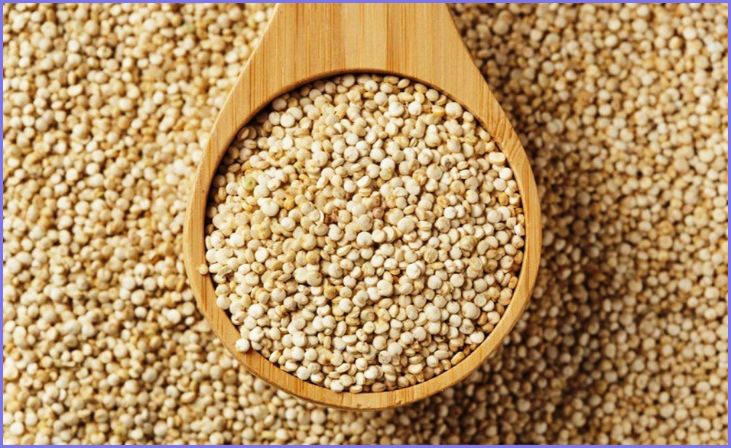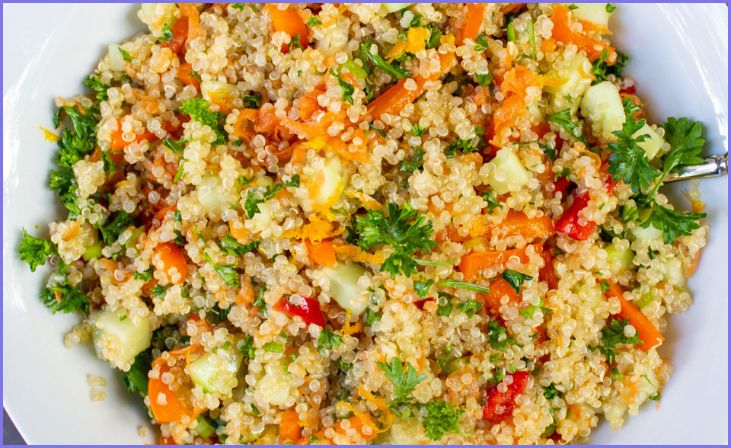In recent years, the culinary world has witnessed a remarkable transformation with the growing popularity of the Golden Grain, often known as quinoa. This humble grain has taken the food industry by storm, becoming a favorite among chefs and home cooks alike. What’s even more impressive is that this surge in popularity isn’t just a culinary trend; it’s driven by the numerous health benefits that the Golden Grain brings to the table.
The Golden Grain’s rise to fame isn’t surprising when you consider its versatility and the array of advantages it offers to those who choose to incorporate it into their diet. In this article, we’ll embark on a journey to uncover the ten best benefits of the Golden Grain. We’ll delve deep into its nutritional value and its profound impact on health. From providing essential nutrients to aiding in weight management, this grain emerges as a nutritional powerhouse that caters to a wide range of health-conscious individuals.
1. A Nutrient Powerhouse

The Golden Grain, also known as quinoa, stands out as a nutritional powerhouse. It’s an abundant source of essential nutrients, brimming with vitamins, minerals, and antioxidants. However, what truly distinguishes it is its remarkable protein content. For vegetarians and vegans, the Golden Grain is a treasure trove of plant-based protein. This grain is unique because it contains all nine essential amino acids, making it a complete protein source that rivals animal products.
Also Read:- Health Benefits Of Chia Seeds
2. Heart Health

When it comes to maintaining a healthy heart, the Golden Grain is a true ally. It offers a combination of heart-healthy monounsaturated fats and dietary fiber. These components work in harmony to reduce the risk of heart disease. Additionally, the Golden Grain is a rich source of essential minerals like potassium, magnesium, and folate, all of which are crucial for a strong and resilient cardiovascular system.
3. Weight Management

If you’re on a quest for effective weight management, the Golden Grain should be at the top of your list. Its high fiber content is a game-changer in this regard. By consuming the Golden Grain, you can feel full for longer periods, which in turn reduces overall calorie intake. Moreover, its low glycemic index ensures that your blood sugar levels remain stable, preventing those unwanted rapid spikes that often lead to unhealthy snacking.
4. Digestive Health

The Golden Grain is not only a treat for your taste buds but also a boon for your digestive health. Its fiber content acts as a natural regulator, promoting smooth digestion and preventing issues like constipation. Furthermore, the presence of antioxidants in the Golden Grain can reduce inflammation in your digestive tract, offering comfort and well-being from within.
5. Gluten-Free Delight

For those with gluten sensitivities or celiac disease, the Golden Grain is a true blessing. It is inherently gluten-free, eliminating the need to worry about gluten-related health concerns. This not only makes it a safe option but also a delicious alternative for individuals who need to avoid gluten in their diets.
6. Bone Health

Strong and healthy bones are essential for overall well-being, and the Golden Grain plays a significant role in achieving this. It’s packed with essential minerals such as magnesium, phosphorus, and manganese, all of which are vital for bone health. Regular consumption of the Golden Grain can lead to better bone density and improved overall bone health.
7. Skin Benefits

The Golden Grain’s remarkable antioxidant properties extend beyond your internal health. They also have the power to promote healthy and radiant skin. By combating free radicals, antioxidants help in preventing premature aging and protecting your skin from damage. Adding the Golden Grain to your diet not only nourishes your body from the inside but also contributes to a glowing and youthful complexion.
8. Balanced Blood Sugar

Individuals with diabetes or those who are concerned about maintaining balanced blood sugar levels will find the Golden Grain a valuable addition to their diet. With its low glycemic index and high fiber content, it helps regulate blood sugar effectively, reducing the risk of sudden spikes and crashes, ensuring a steady and stable energy supply throughout the day.
9. Energy Boost

Do you often feel sluggish, especially in the middle of a busy day? The Golden Grain can provide you with the energy you need. It contains complex carbohydrates that release energy slowly, offering a sustained vitality that keeps you going, even during the most demanding of tasks.
10. Versatile in the Kitchen

Last but not least, the Golden Grain’s culinary versatility is a significant advantage. You can incorporate it into a wide range of dishes, from refreshing salads to hearty soups and even delightful desserts. Its adaptability in the kitchen allows you to create diverse, nutritious, and mouthwatering meals that cater to various tastes and preferences.
Also Read:- Fruits to Prevent Hair Fall
Conclusion
In conclusion, the Golden Grain, commonly referred to as quinoa, emerges as a remarkable addition to any diet. Its exceptional nutritional value profile, combined with its myriad of health benefits, positions it as a wise and flavorful choice for those seeking to enhance their overall well-being. This versatile grain has captured the hearts and taste buds of many, and it’s not difficult to understand why.
One of the key takeaways from our exploration of the Golden Grain is its impressive nutritional density. It serves as a natural treasure chest of vitamins, minerals, and antioxidants, all of which contribute to its exceptional nutritional value. What truly sets quinoa apart, however, is its extraordinary protein content. As a complete protein source containing all nine essential amino acids, it caters to a wide range of dietary preferences, making it a prime choice for vegetarians and vegans.
Furthermore, the Golden Grain extends its appeal to the realm of heart health. With its combination of heart-healthy monounsaturated fats and dietary fiber, it offers a unique proposition for reducing the risk of heart disease. The inclusion of key minerals like potassium, magnesium, and folate further contributes to maintaining a strong and resilient cardiovascular system, providing assurance to those concerned about their heart’s well-being.
FAQs
Yes, the Golden Grain is a common name for quinoa, known for its bright golden color.
You can cook it like rice or use it in salads, soups, and even as a breakfast cereal.







